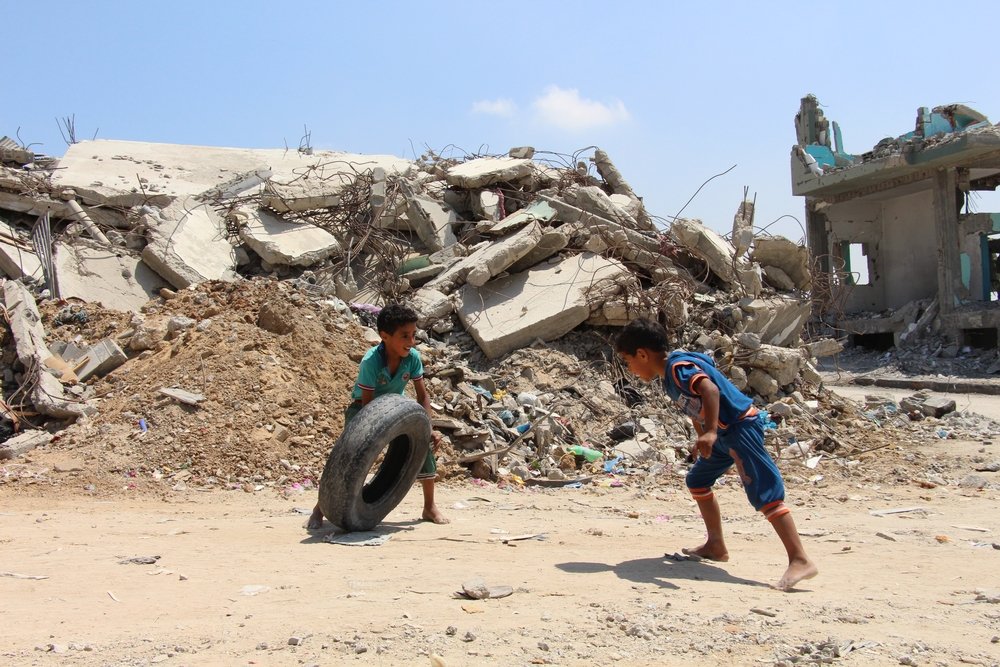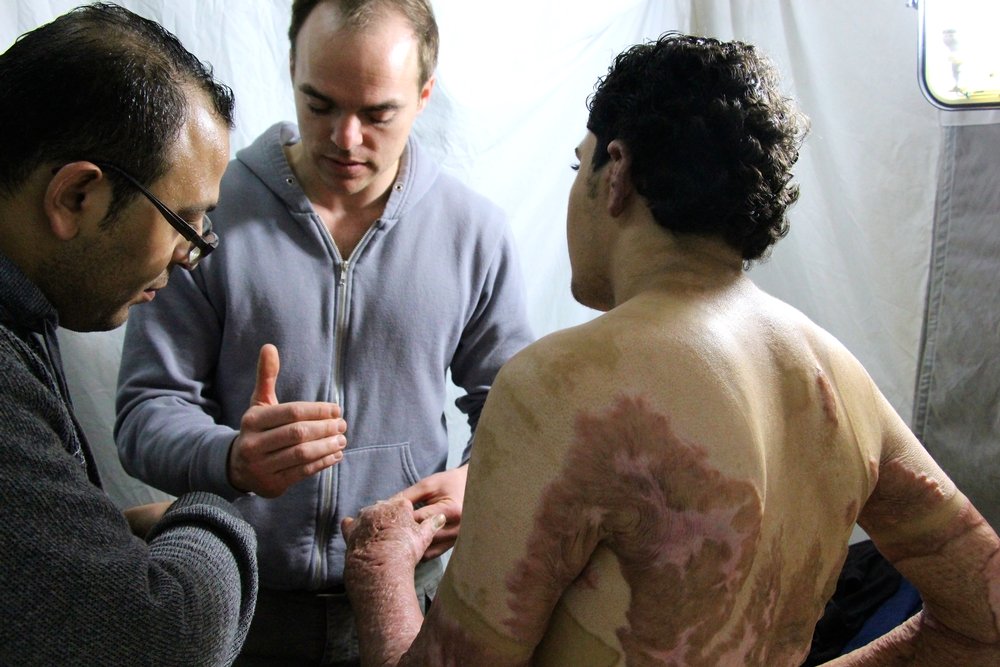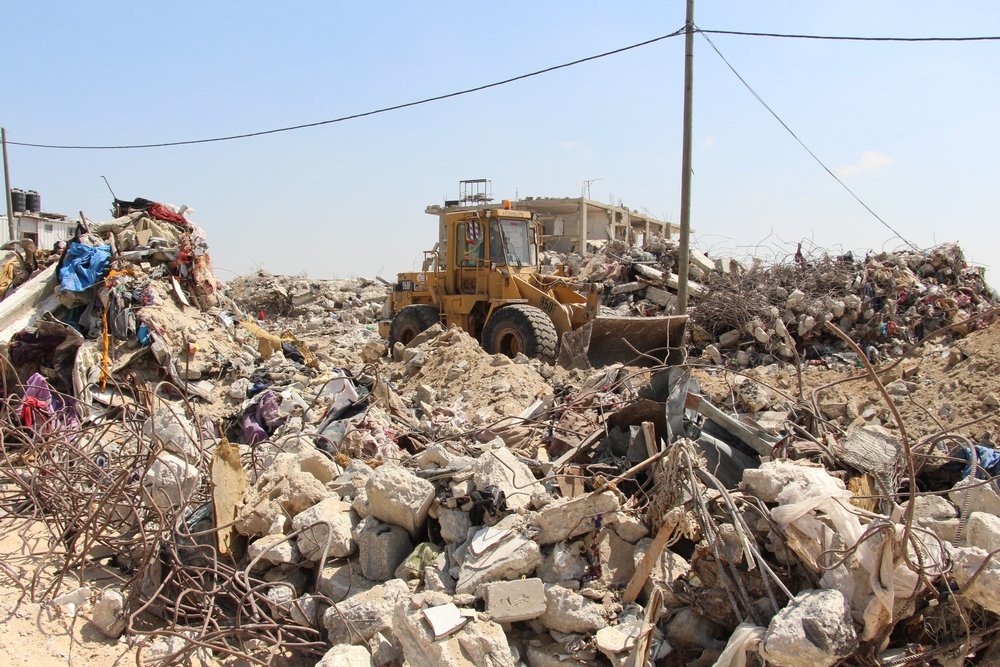
Wednesday 8 July marks one year after the 51-day war in Gaza, during which more than 2,200 people were killed, and over 11,000 injured, most of them women and children.
Yet, MSF teams working in the Occupied Palestinian Territories (Gaza and the West Bank continue to witness the long-lasting and devastating health impact of the continued Israeli military blockade and siege of Gaza. These consequences as well as the brutality and disregard for the human consequences of the Israeli occupation have become normalised.
The below PRESS RELEASE outlines how the Israeli blockade on Gaza, which is limiting everything from medical supplies to essential building materials, as well as the continued occupation of the West Bank is having far reaching mental and physical health consequences on a trapped population that have now lived through four offensives.
Informed by its experience of working in Gaza since 1989 and in the West Bank since 2001, MSF is calling for an end to enduring cycle of violence, and for governments and institutions that actively or tacitly support Israel’s security policies, to consider the humanitarian impact of doing so.
For a deeper analysis of what MSF staff witness in Palestine can read this moving essay by MSF USA’s general director, Jason Cone, written during his visit in April 2014 to the Palestinian Occupied Territories. https://www.doctorswithoutborders.org/article/aiding-abetting-limits-hum...

Johannesburg, Jerusalem, July 8, 2015 – A year after the 51-day war in Gaza, hundreds of Palestinians with devastating injuries from the Israeli assault still fill the waiting rooms of the international medical humanitarian organisation Doctors Without Borders (MSF) in need of complex reconstructive surgeries and physical rehabilitation.
With the continued blockade and siege of Gaza, it is as if the latest round of Israeli-Palestinian bloodshed had just ended, says MSF. Today, MSF sees, perhaps more than at any time in its 20-year history of providing medical and psychological care in Gaza and the West Bank, how the suffering wrought by the Israeli occupation has become normalized and how an end to the occupation is the only way to ease the suffering of Palestinians.
The human toll of latest Gaza war was appalling: more than 2,200 were killed and more than 11,000 were wounded, including almost 7,000 women and children.
“Eight-year-old children in Gaza have known nothing but the blockade and war since they were born,” says Erwan Grillon, MSF’s head of mission for Gaza and the West Bank. “And they’ve already lived through four military offensives, two of which were absolutely devastating and indiscriminately killed a shocking number of civilians. The majority of our patients who still require war-related surgeries and physiotherapy are children under 18.”
In MSF clinics, Palestinians still dealing with the complications of their war injuries are now packed alongside Gazans, mostly young children, who have suffered severe burns from home heating and cooking accidents as result of being forced to live in makeshift or damaged homes.
More than 12,000 houses were damaged or destroyed during the war, as were more than 70 hospitals or health structures.
The Israeli military blockade of Gaza continues to starve the territory of desperately needed supplies, including building materials that could help rebuild some of the neighbourhoods that were reduced to rubble by the Israeli military.
Israel has put severe restrictions on cement and other building materials, which are considered “dual-use” items that could potentially also be used to create weapons, leading to few houses being repaired in the strip.
“Living conditions keep on deteriorating,” says Grillon. “In our post-operative clinic in Gaza, the majority of our patients were treated for burns from explosions caused by the use of unsafe home heating products or in household cooking accidents in homes damaged during the war. Sixty percent of them were children.”

As a consequence of the blockade, people are still living in terribly unsafe conditions and almost entirely dependent on outside aid. Unemployment is at record high—more than 40 percent overall and more than 60 percent among the young—and 80 percent of the population is at least partially dependent on humanitarian aid.
While the devastation of the war in Gaza and the ongoing blockade of the strip have garnered the most international attention, the occupation of the West Bank illustrates another form of oppression that also has widespread public health consequences.
The Palestinian population in the West Bank is subjected to indignities, threats, and humiliations on a daily basis. Today, due to settlements, byways, checkpoints, and military deployments, Palestinians can only inhabit less than 40 percent of the West Bank.
MSF mental health programs are filled with patients suffering from psychological disorders as a result of being subjected to endless harassment, frequent (and unpunished) settler violence against individuals and property, night raids, administrative detention, or other acts.
“The stories our teams tell us are such that merely stating the facts should be enough to denounce them,” says Grillon. “On a daily basis we see patients, a third of whom are younger than 13, in a constant state of anxiety and terror because of night-time incursions by Israeli soldiers and settler attacks. We’ve been treating the same families presenting the same symptoms for the past ten years. Nothing has changed.”
As a direct result of the perpetuation of the occupation and the complete failure of any political process, Palestinians in both Gaza and the West Bank are trapped in a never-ending cycle of violence that must be addressed frankly and urgently.
Measures taken by Israel in the name of security must be judged in terms of their humanitarian fallout. And the governments and international institutions either explicitly or tacitly supporting these policies must likewise consider the human costs of these policies, given the undeniable devastation they have wrought.
“Trying to create a false equivalence in terms of responsibility for the current situation in the West Bank and Gaza simply obscures the reality of responsibility for the violence in the Occupied Territories,” says Dr. Mego Terzian, president of MSF France.
“Employing the rhetoric of self-defence to seize territory and continue a brutalizing occupation, Israel and its international backers have sought to codify a system that is wounding Palestinians day after day, smothering life and hope, and guaranteeing more of the same in the future.”
MSF has been working in Gaza since 1989, providing medical care according to people’s needs, addressing specific medical needs that cannot be met by Gaza’s health service, and responding to the direct or indirect consequences of violence. Medical activities have included surgery, post-operative care, dressing care, psychological care, occupational therapy and physiotherapy, including specialized physiotherapy for the hand.
In the West Bank, MSF has been running mental health programs in East Jerusalem since 2011 and in Jenin, Hebron, Nablus, and Qalqilya
For more information or to arrange interviews:
Kate Ribet, Media Liaison Officer, MSF SA
kate.ribet@joburg.msf.org | 079 872 2950 | @msf_SApress
Angela Makamure, Press Officer, MSF SA
angela.makamure@joburg.msf.org | 084 977 7553 | @angiemubwanda
Find out more about MSF in Palestine.